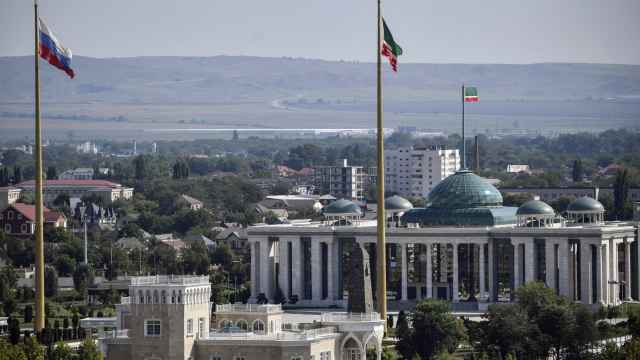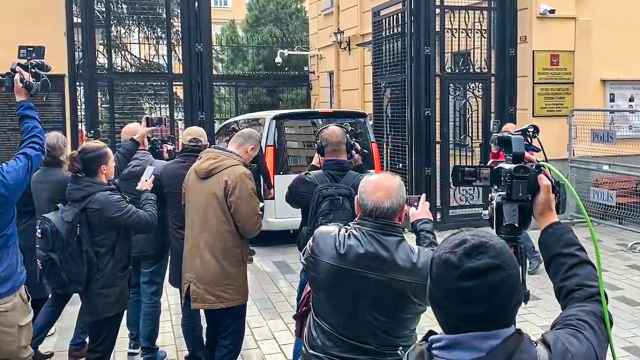As two burly border guards took me to their station in the Ukrainian city of Vylkove, about 200 kilometers south of Odessa, I angrily thought to myself, “I hope Russia will never be governed by the rule of law.” Vylkove, the “Ukrainian Venice,” is located at the edge of the Danube delta. Canals crisscross the tiny town, and boats are still the main form of transportation.
Looking at my passport, a guard told me: “You don’t have an immigration card. We’ll have to detain you to confirm your identity and determine whether you entered Ukrainian territory legally. After that, your case will go before a judge who will either give you a verbal warning or a fine.”
To understand my shock, you should know that I have been visiting my mother-in-law in Odessa every year for the past 15 years, and nobody has ever taken any interest whatsoever in my passport. This time, I was visiting Vylkove on a tour bus excursion organized by a reputable travel agency. For safekeeping, I had left my immigration card and return ticket to Moscow at my mother-in-law’s apartment in Odessa.
The entire busload of travelers spoke up on my behalf. The travel agency director got on the phone with the guards’ commanding officer, and one of the passengers called Odessa to inform somebody that a Moscow journalist was being detained in Vylkove. The whole thing was quickly escalating into an international scandal.
In response to this pressure, the guards informed me of my rights. “As a foreigner, you can use the services of a translator,” one said in perfect Russian, “and you can obtain a lawyer.” That was when I understood I was really in trouble. Worse, I remembered that Ukraine would be celebrating its independence day for the next 48 hours, meaning that my trial would not even start soon.
“Maybe we can settle this without a trial,” I suggested, offering a bribe for the first time in my life.
“It’s too late,” the senior guard answered. “Too many people are already involved in your case.” There seemed to be sincere regret in his voice. They escorted me to the police station, filled out a long report and fined me 60 hryvnas ($7.50).
Our bus returned to Odessa late at night. Because the city buses had stopped running, many of my fellow sightseers had to take costly cabs instead, cursing as they did the border guards, Vylkove, the travel agency and me. But, as the ancients used to say, “Let the world collapse, but the rule of law remains.”
This was the second bothersome incident I suffered this summer because of a collision between democracy and common sense. In late June, I found myself in the small town of Greenock in western Scotland, and I was absolutely charmed with its natural beauty and the hospitality of its residents. But then I read a crime report in the local newspaper and was literally shocked by the contrast between my rosy impression of the place and the ghastly picture painted by the journalists. I wrote a piece about that column, jokingly referring to Greenock as “the crime capital of Britain.” Several British publications drew attention to this piece, and the fathers of the city hurled every conceivable epithet and accusation at me. My reputation in Scotland was ruined because I believed their free and independent press more than what I had seen with my own eyes.
What lessons for Russia can be drawn from these summer mishaps? Perhaps that it is already too late to escape having a free press, but that there is still time to avoid establishing the rule of law.
Alexei Pankin is editor of IFRA-GIPP Magazine for publishing business professionals.
A Message from The Moscow Times:
Dear readers,
We are facing unprecedented challenges. Russia's Prosecutor General's Office has designated The Moscow Times as an "undesirable" organization, criminalizing our work and putting our staff at risk of prosecution. This follows our earlier unjust labeling as a "foreign agent."
These actions are direct attempts to silence independent journalism in Russia. The authorities claim our work "discredits the decisions of the Russian leadership." We see things differently: we strive to provide accurate, unbiased reporting on Russia.
We, the journalists of The Moscow Times, refuse to be silenced. But to continue our work, we need your help.
Your support, no matter how small, makes a world of difference. If you can, please support us monthly starting from just $2. It's quick to set up, and every contribution makes a significant impact.
By supporting The Moscow Times, you're defending open, independent journalism in the face of repression. Thank you for standing with us.
Remind me later.





